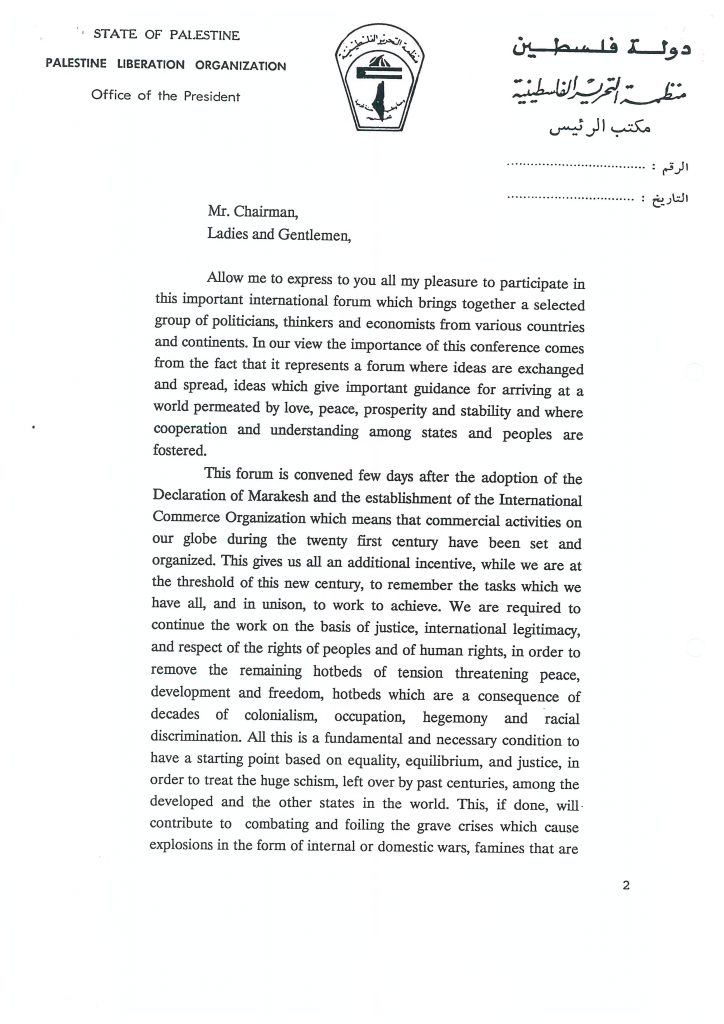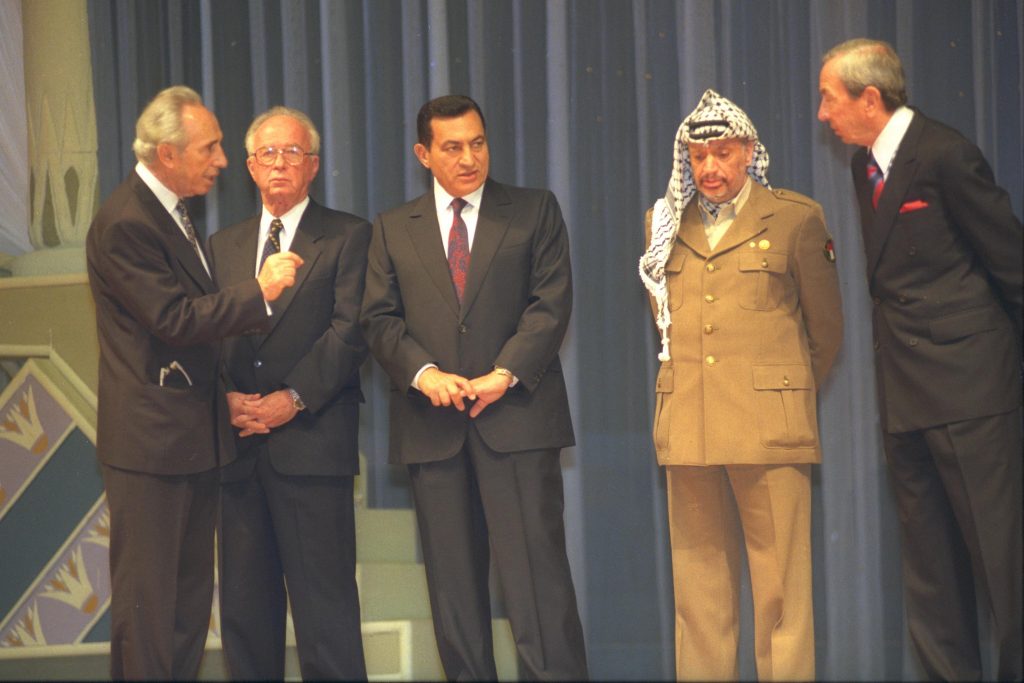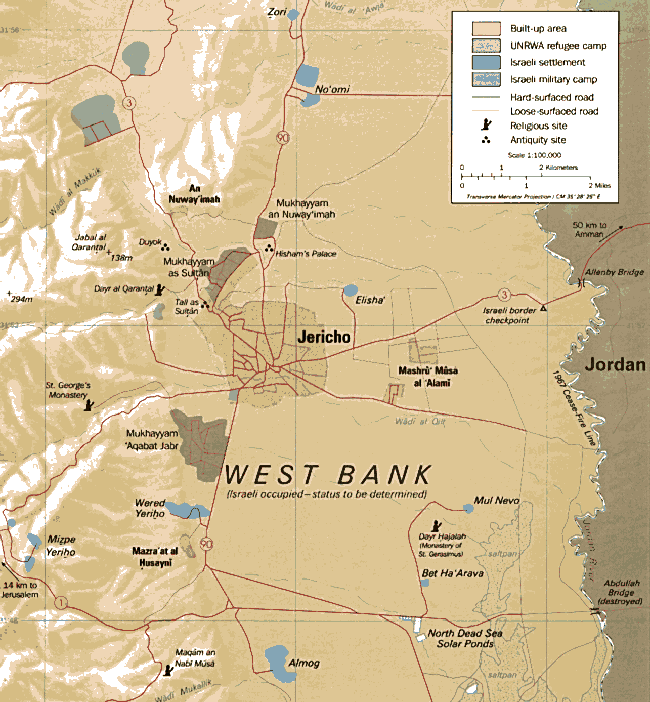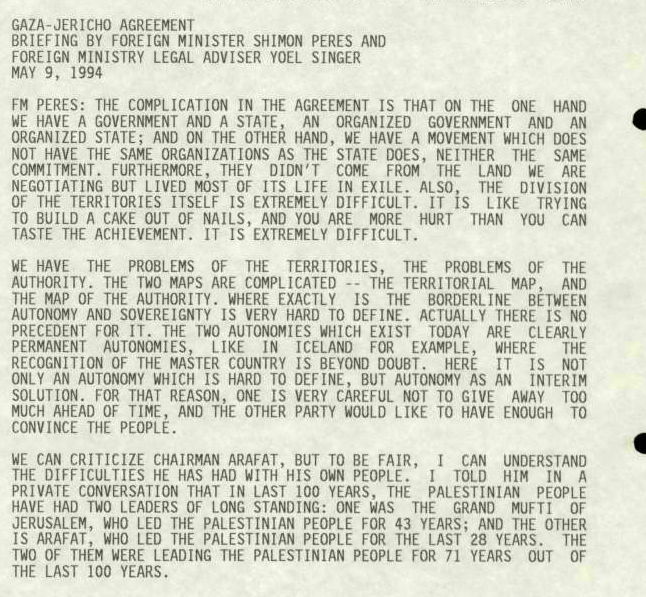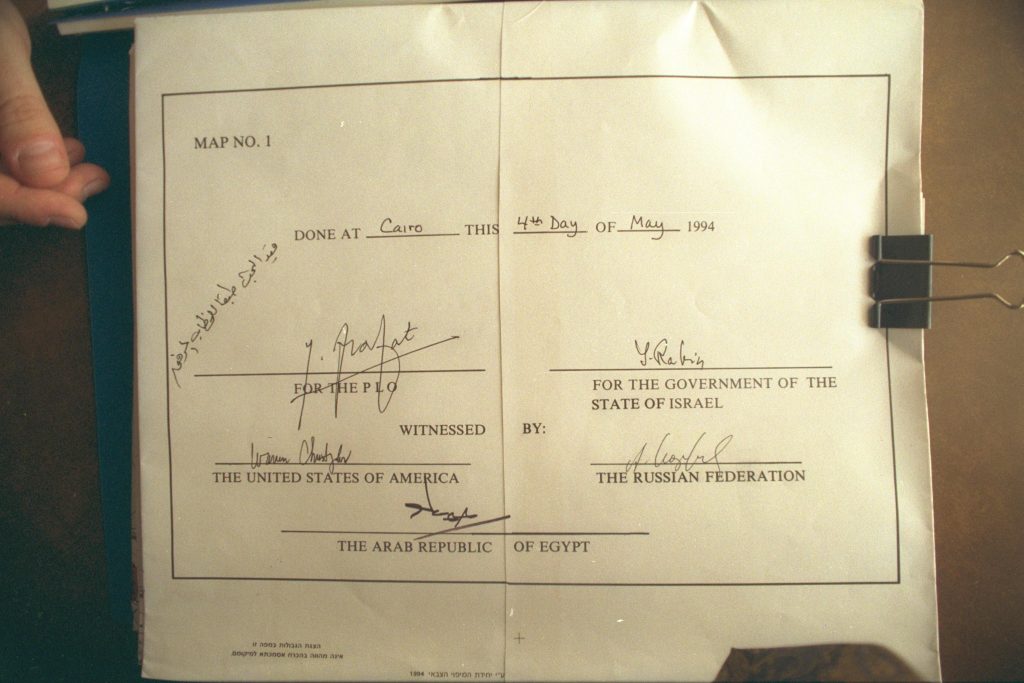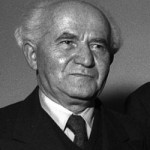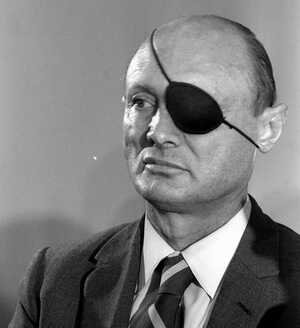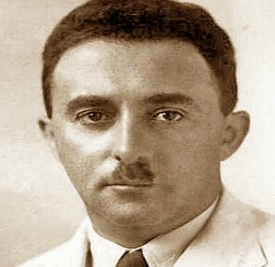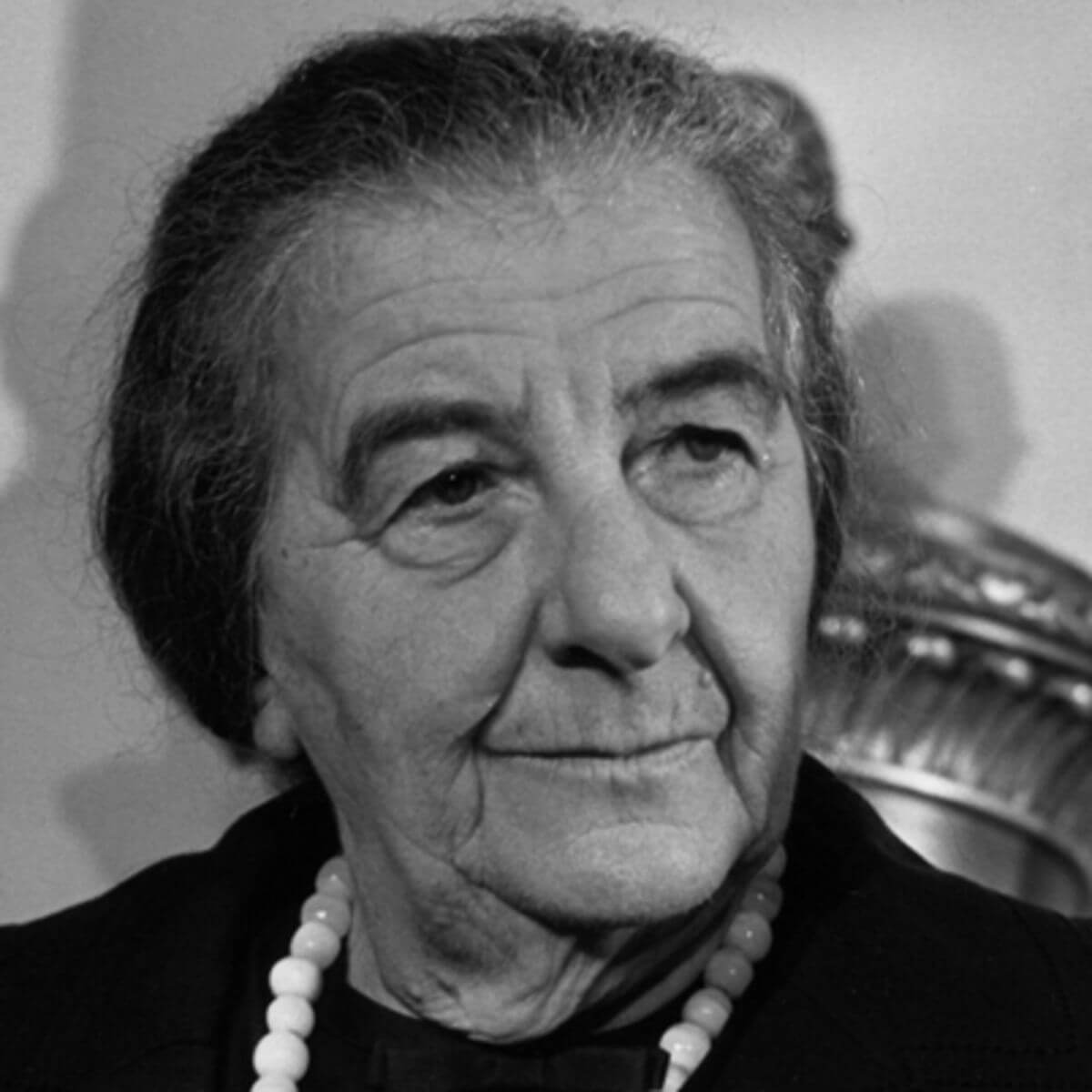ה.1 | Continuing negotiations in the shadow of Hamas terrorism
.On April 6, the economic negotiations resumed in Paris. The parties discussed whether the Israeli shekel would be legal tender in the Palestinian Authority and arrangements for trade in agricultural produce. It was agreed to establish a monetary authority with the powers of a central bank, but they did not reach an agreement on the issues of coinage and the right to print money (Document 92).
Palestinian reaction to the resumption of negotiations
According to a Foreign Ministry briefing, although the Hebron agreement did not meet all of the demands of the PLO leadership, they understood that in the current situation it was the most that could be achieved, and therefore expressed satisfaction. On the other hand, supporters of the peace process in the territories were disappointed and claimed the international presence did not really ensure the security of the population. Michael (Mickey) Harari of the Foreign Ministry analyzed these responses, pointing out that the agreement, together with the return of exiles to the territories and the continued evacuation of IDF camps in the Gaza Strip, was making clear to the Palestinian public the changes to be expected when the Gaza and Jericho agreement was implemented. Yet these changes could not completely erase feelings of confusion and scepticism, or prevent criticism. Some claimed that the leadership was influenced by its members’ desire to return home. They said this return should not be achieved at any cost, at the expense of national interests. As the establishment of the Palestinian government approached, many were concerned whether they would still be able to work in Israel, and how the Palestinian police would treat the local population.
As expected, members of the opposition inside and outside the territories reacted sharply against the Hebron agreement. They condemned Arafat’s return to the negotiations and called on the Palestinian people to continue their struggle. The Foreign Ministry concluded that the agreement had deepened the divide between the PLO leadership and the general public in the territories (Document 89, interview with Farouk Kedoumi, April 3, 1994, Document 94).
The Hammas response: terrorist attacks in Afula and Hadera
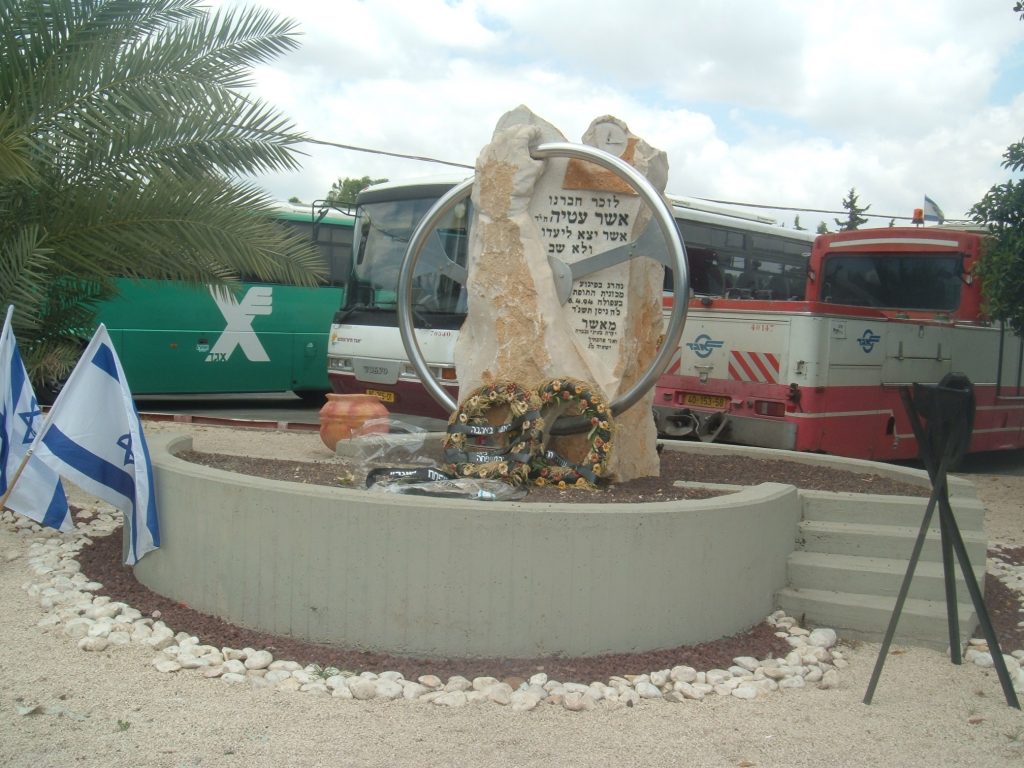
A monument in memory of the bus driver killed in Afula, Asher Atia, by the sculptor Reuven Gafni. Photo: Wikipedia
April 6, 1994 marked the 40th day since the Hebron massacre. On this date Hamas carried out a suicide bombing at a bus stop in Afula next to an Egged bus, in which eight people were killed and 55 wounded. In response, the border with Israel was closed to Palestinians and 383 Hamas operatives arrested throughout Judea, Samaria and Gaza. The attack drew sharp criticism in Israel, claiming that it was a result of the negotiations with the PLO, which should therefore be stopped. Demonstrations were held in Afula and other places, and torch-bearing protestors waved signs against the peace process. In Afula, slogans were shouted praising Baruch Goldstein. Peres responded by linking the attack in Afula to the massacre in the Cave of the Patriarchs and the attempt by extremists to sabotage the negotiations. He said he felt great sorrow and mourning, but the peace talks should continue as planned and they should not allow Hamas and Islamic Jihad to sabotage them (Document 91).
The UN secretary general and members of the Security Council condemned the attack. Many also expected Arafat to condemn it and the fact that he did not do so increased criticism in Israel. In a meeting that Peres held with Faisal al-Husseini on April 10, Husseini explained Arafat’s difficulty in view of the tense situation in the territories. He himself clearly condemned terrorism. “There is a vicious circle: negotiations are difficult. We have difficulty responding strongly when events like that in Afula occur. You therefore have difficulty implementing the agreement.” Peres said that negotiations on the agreement could end tomorrow. The “Twilight Zone” must be crossed quickly (Document 95).
Talks in Cairo were continuing, but Arafat repeatedly complained to foreign journalists and diplomats that Israel was delaying the negotiations and that the IDF’s withdrawal from Gaza and Jericho, which was scheduled to end on April 13, would not take place on time. Despite these complaints, on April 12 Rabin sent Arafat a message through President Mubarak on the need to speed up the talks and not to reopen issues that were already agreed on. The fact that Arafat had not condemned the despicable murder in Afula did not help the Israeli government (Document 93).
On the morning of April 13, 1994, the day of remembrance for Israel’s fallen soldiers, exactly one week after the attack in Afula, a Hamas suicide bomber boarded an Egged bus leaving for Tel Aviv at the central station of Hadera. When the bus left the station, he placed a bag with an explosive device on the floor and blew it up. Five people were killed and 30 were injured. When rescue workers arrived, a pipe bomb exploded, which fortunately did not hurt anyone else. Hamas claimed responsibility for the attack.
The continuation of the attacks and the outraged public reaction increased the pressure on both sides. Arafat, who had been under American pressure since the attack in Afula, expressed his regret in a speech that day before the European Council in Strasbourg. He rejected “unfortunate actions by Palestinian extremists against innocent civilians,” but did not explicitly condemn the attack in Hadera and linked it to Israeli policy which was delaying the implementation of the DOP. According to a briefing by the Foreign Ministry, based on a report by the Palestinian News Agency, Rabin and Arafat spoke on the telephone on Arafat’s initiative (text not found) and Arafat expressed his sorrow and conveyed his condolences to the families of the victims. At the same time, however, PLO Radio Algeria, the organization’s official propaganda mouthpiece, made extremist comments and praised the operation in Afula. According to the briefing, the PLO did not see the attacks as obstacles which would hamper continued negotiations with Israel. It added that in Cairo the parties had reached an agreement on a number of issues: the Palestinian police, the release of prisoners (and whether they would include Hamas operatives, which the PLO believed would help them reduce Hamas’ opposition) and the agreement to return another group of deportees. There was also progress in the discussions of the Civil Committee and the Economic Committee in Paris. It seemed that the PLO wanted to sign and implement the issues that were agreed and leave the controversial ones for later. However, there had recently been a reverse in the positive tone and they mention a number of issues whose conclusion is a condition for signing. The author of the document believed that Arafat himself was behind this position, and behind the attacks on Israel that he and his staff express publicly (Document 96).
The progress in the talks sent the donor countries into high gear in their activities to raise international funding for the establishment of the Palestinian police force. Following their meeting, which took place in Cairo on March 24 (see Chapter 3 above), it was decided to establish a small coordination committee including Norway, the sponsoring countries (Russia and the US), the EU, Japan, Egypt, Israel and the PLO. The committee would meet in Cairo and organize assistance and securing donations A joint PLO-Israeli security committee would receive the funds and transfer them to the Palestinian police. The Palestinians wanted to receive the donations in cash while the donors refused to give funds directly to the PLO, as long as there was no qualified and reliable body to accept them (Document 97, Review of the Arab Department 2, 20.4.1994).
On April 21, the Foreign Ministry reported to Peres’ bureau on the Cairo talks: the wording on the transfer of civilian powers had been agreed, despite disagreements over the map of Gaza. Reports had also been received about statements on behalf of Hamas indicating a change in their positions. Hamas’ political bureau had declared its readiness to run in the elections and to take part in self-governing bodies, subject to Israel’s full withdrawal from all the territories occupied in 1967. Hamas was also prepared to reconsider the types of attacks it made (against civilians). The attacks in Afula and Hadera were “unusual” since the movement’s policy was to harm only “soldiers and settlers.” The report raised the possibility that the statements were made in order to present a more moderate image and not to lose the opportunity to take part in the implementation of the “Gaza and Jericho” agreement (Document 99).

